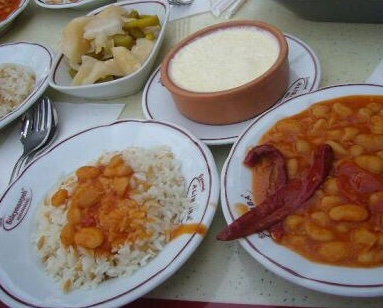The idea of visiting the Süleymaniye Mosque and its environs always comes to my mind together with a much loved threesome of the Turkish cuisine. No matter how many times I have been to Süleymaniye, I always tend to think of it as a treat after much admiring, pondering over and walking around the fabulous mosque complex. This anticipated meal is white haricot beans (kuru fasulye in Turkish) cooked with tomato sauce, pilaf made of white rice and pickles. Generally thought as a regular menu for the poor, there is no doubt that Turks love haricot beans and pilaf whether they are rich or poor. According to several sources, it was also a favourite of Atatürk, the founder of modern Turkey.
Right across the street from the Süleymaniye Mosque, you will see several restaurants, lined up next to each other, that serve the above-mentioned famous menu. The shops are actually located inside some of the historical buildings of the complex. They all claim to be a famous ‘kuru fasulyeci’ (place or person who cooks and serves white haricot beans) and no doubt they all have their own loyal clientele. However, there is one among them which to me, is the one. Recommended by several foreign guide books and websites on Istanbul, it has a well-deserved fame. This is the historical Erzincanlı Ali Baba Restaurant. Erzincan is a town in East Anatolia. The founder Ali Baba, who was from Erzincan, started his business here in 1924. I remember the first time I went there more than twenty years ago. Then it was a very modest place with long benches and long tables covered with oilcloth. The menu was also limited to only the three specialties of the shop. Even so, there was hardly a free table at any time. Today, the menu is supplemented with other Turkish dishes and the place looks more modern. Still, people mainly come here for the beans, pilaf and pickles.

The third generation owners of Ali Baba claim that the secret of their quality relies on the quality of the ingredients. The beans are always from Erzincan. Likewise, all the other ingredients are supplied from places that are renowned for the respective inputs, such as the rice, the tomatoes, the onions etc. Apart from that, the beans are cooked very slowly in special, big copper cauldrons and left to simmer over coal fire.
Some people prefer to eat the beans and the pilaf separately. Personally, I like to eat them together like most Turkish people do. Putting the beans on top of the pilaf and letting some of the delicious gravy seep through the rice. All the while you are eating, never forget to take a bite of the pickles on the side from time to time. If you go to the Erzincanlı Ali Baba Restaurant, I also recommend you try the Turkish desserts that they offer. Pumpkin dessert with grinded walnut on top or quince dessert with cream are my favourite. As always, the best closure after that would be a cup of Turkish coffee…

Yoghurt is always welcome as a side dish…
Kuru Fasulye is a dish that we also like to cook at home. Everyone has their own way of cooking with slight variations. I’ll tell you the way I cook it. First of all, you will need about two cups of dried haricot beans that you must soak in water for at least 10 hours. It is best to do the soaking during the night and cook in the morning. Two chopped onions must be sautéed in olive oil. Then you can add about half a kilo of diced meat and sauté a little bit more. The meat can be lamb or veal. I prefer veal. In fact, some people cook the haricot beans without any meat at all. Add a spoon of tomato paste. In addition, you can also put diced tomatoes, if you want to. Lastly, add the beans, salt, pepper and water. The amount of water depends on whether you are using a pressure cooker or a regular pot. I always prefer the former since it is quicker to cook with. Then, about 1 litre of water should be enough. I always make sure the level of water covers the ingredients in the cooker. 45 minutes to 1 hour cooking (after the pressure cooker comes to a boil and the heat is reduced) is ideal for me. If you are not using a pressure cooker, you will need more water (1.5 to 2 litres) and more cooking time. After coming to a boil, reduce the heat and let it simmer until the beans and meat are tender. You might have to add water from time to time. When cooked, your beans must have a thick broth and a soft texture. You can then serve it with pilaf and pickles.
Afiyet Olsun! (*)
_________________________
(*)- Afiyet Olsun is an expression in Turkish that cannot be easily translated to English. It more or less implies a wish so that what you are about to eat or have eaten already may bring you good health. It can be said before, during or after a meal. A couple of decades ago, it was more common to say it after eating something. Today, it seems to have acquired the meaning of bon appétit in French and to be more widely used before starting a meal.
